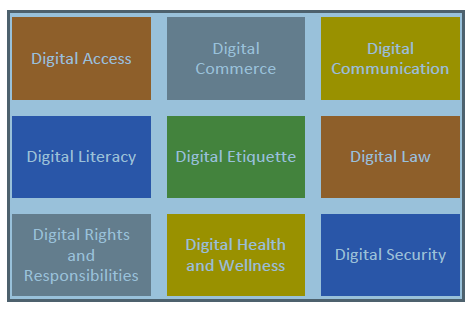Ribble (2011) identifies nine elements that make up digital citizenship, encompassing the issue of the use, abuse and misuse of technology. Briefly, discuss these nine elements.
 |
| Nine Elements of Digital Citizenship after Ribble, (2011) |
- Digital Access,
- Digital Literacy,
- Digital Communication,
- Digital Ettiquette,
- Digital Rights and Responsibilities
- Digital Law,
- Digital Commerce,
- Digital Health and Wellness and
- Digital Safety and Security
These will now be discussed individually..........etc
<These are some examples of text with in-text citations and references>:
There are some important digital citizenship aspects (Crockett, Jukes, & Churches, 2011) .
Crockett, Jukes, & Churches (2011) suggest there are some important digital citizenship aspects (Book in-text/referencing example.)
It is well known than digital literacy is hard to teach (Independant Institute of Education, 2017) .
Independant Institute of Education (2017) notes that it is well known than digital literacy is hard to teach
A book in-text/referencing example – the module manual in this case.
Ribble (2011) mentions 5 elements of digital fluency OR There are 5 elements of digital fluency (Ribble, 2011)
Book in-text/referencing example that comes up quite a lot.
This is a description of the 9 elements (Ribble, 2017) – web page in-text/referencing example.
Editing references is most appropriate in MS Word 365 (Young, 2017, pp. 1, Pers. Comm.) OR
Young (2017, pp. 1, Pers. Comm.) indicated that editing references is most appropriate in MS Word 365.
In this example, an interview or personal communication in-text/referencing example where 1 page of information was supplied.
References
Crockett, L., Jukes, I., & Churches, A. (2011). Literacy Is Not Enough: 21st Century Fluencies for the Digital Age (1 ed.). (A. P. Services, Ed.) USA: Corwin.
Koenyane, M., n.d.
The Nine Elements of Digital Citizenship. [Online]
Available at: http://malosenkoenyane.weebly.com/9-elements.html
[Accessed 28 07 2017].
Koenyane, M., n.d.
The Nine Elements of Digital Citizenship. [Online]
Available at: http://malosenkoenyane.weebly.com/9-elements.html
[Accessed 28 07 2017].
Available at: http://malosenkoenyane.weebly.com/9-elements.html
[Accessed 28 07 2017].



Digital citizenship is all about using technology responsibly and ethically. As students explore topics like online safety, privacy, and digital literacy, assignments can get challenging. Seeking guidance from digital marketing assignment help experts can make it easier to understand concepts, craft quality assignments, and improve academic performance while learning essential digital skills.
ReplyDelete